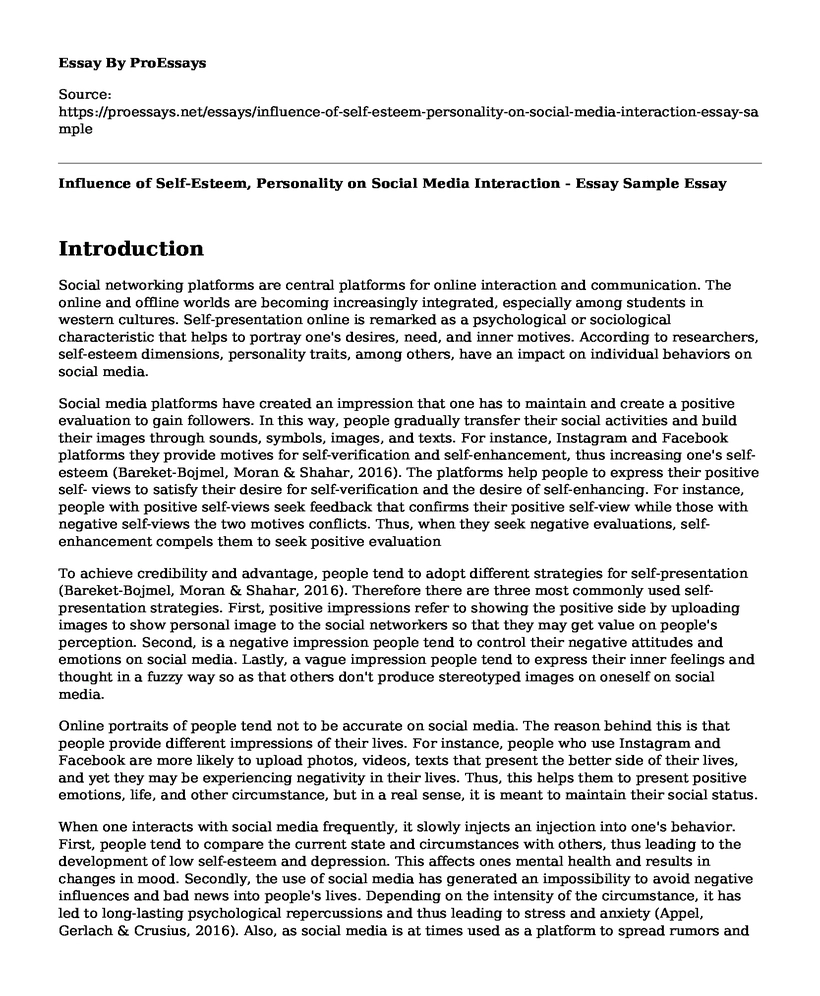Introduction
Social networking platforms are central platforms for online interaction and communication. The online and offline worlds are becoming increasingly integrated, especially among students in western cultures. Self-presentation online is remarked as a psychological or sociological characteristic that helps to portray one's desires, need, and inner motives. According to researchers, self-esteem dimensions, personality traits, among others, have an impact on individual behaviors on social media.
Social media platforms have created an impression that one has to maintain and create a positive evaluation to gain followers. In this way, people gradually transfer their social activities and build their images through sounds, symbols, images, and texts. For instance, Instagram and Facebook platforms they provide motives for self-verification and self-enhancement, thus increasing one's self-esteem (Bareket-Bojmel, Moran & Shahar, 2016). The platforms help people to express their positive self- views to satisfy their desire for self-verification and the desire of self-enhancing. For instance, people with positive self-views seek feedback that confirms their positive self-view while those with negative self-views the two motives conflicts. Thus, when they seek negative evaluations, self-enhancement compels them to seek positive evaluation
To achieve credibility and advantage, people tend to adopt different strategies for self-presentation (Bareket-Bojmel, Moran & Shahar, 2016). Therefore there are three most commonly used self-presentation strategies. First, positive impressions refer to showing the positive side by uploading images to show personal image to the social networkers so that they may get value on people's perception. Second, is a negative impression people tend to control their negative attitudes and emotions on social media. Lastly, a vague impression people tend to express their inner feelings and thought in a fuzzy way so as that others don't produce stereotyped images on oneself on social media.
Online portraits of people tend not to be accurate on social media. The reason behind this is that people provide different impressions of their lives. For instance, people who use Instagram and Facebook are more likely to upload photos, videos, texts that present the better side of their lives, and yet they may be experiencing negativity in their lives. Thus, this helps them to present positive emotions, life, and other circumstance, but in a real sense, it is meant to maintain their social status.
When one interacts with social media frequently, it slowly injects an injection into one's behavior. First, people tend to compare the current state and circumstances with others, thus leading to the development of low self-esteem and depression. This affects ones mental health and results in changes in mood. Secondly, the use of social media has generated an impossibility to avoid negative influences and bad news into people's lives. Depending on the intensity of the circumstance, it has led to long-lasting psychological repercussions and thus leading to stress and anxiety (Appel, Gerlach & Crusius, 2016). Also, as social media is at times used as a platform to spread rumors and negativity, it has resulted in changing of behaviors among people; thus, violence cases increase such as killings and kidnappings. Lastly, it has resulted in a lack of personality's development, communication skills and learning g skills which are brought by face to face interactions thus leading to unsocial able behavior (Chen, Pan & Guo, 2016).
It helps in psychological development and creates self-identity among the youths, which result in simultaneous intimate relationships, preferences, ideology collection, and display. Moreover, it helps people to create a personal homepage which creates an identity to the social media community and thus develops to a direct and general means of communication. Furthermore, social media provides a simpler and quicker way to contact with people which make it easier to get exposed to diverse people (Anderson & Jiang, 2018).
However, social media provides people with less interpersonal skills which translate to lack of conflict resolution. Secondly, people develop self-image issues when they compare themselves with others, thus leading to low self-esteem (Appel, Gerlach & Crusius, 2016). Thirdly, people express unrealistic expectations which lead to negative feelings to those who can't meet those standards. Besides, the fear of missing out on updates and uploading status thus makes it addictive. Lastly, depression and anxiety are developed when on spend more hours on social networking, thus affecting mental health (Anderson & Jiang, 2018).
References
Anderson, M., & Jiang, J. (2018). Teens, social media & technology 2018. Pew Research Center, 31, 2018.
Appel, H., Gerlach, A. L., & Crusius, J. (2016). The interplay between Facebook use, social comparison, envy, and depression. Current Opinion in Psychology, 9, 44-49.
Bareket-Bojmel, L., Moran, S., & Shahar, G. (2016). Strategic self-presentation on Facebook: Personal motives and audience response to online behavior. Computers in Human Behavior, 55, 788-795.
Chen, X., Pan, Y., & Guo, B. (2016). The influence of personality traits and social networks on the self-disclosure behavior of social network site users. Internet Research, 26(3), 566-586.
Cite this page
Influence of Self-Esteem, Personality on Social Media Interaction - Essay Sample. (2023, Feb 17). Retrieved from https://proessays.net/essays/influence-of-self-esteem-personality-on-social-media-interaction-essay-sample
If you are the original author of this essay and no longer wish to have it published on the ProEssays website, please click below to request its removal:
- Strategic Communication in Project Management Paper Example
- Representation of Time in Modernist Literature Essay
- Essay Sample on St. Catherine of Siena: A Welcoming & Empowering Community
- Symbolism and Perspective Essay
- Essay Example on Ancient Greek Letter Writing: Paul's Epistles
- Essay Example on Gender Parity: From Traditions to Equality
- Audience, Performers, Instrumentals Unite in Big Room Music - Essay Sample







